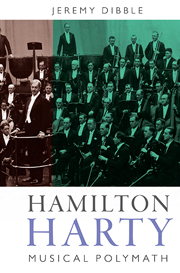Book contents
- Frontmatter
- Dedication
- Contents
- List of Illustrations
- List of Music Examples
- Preface
- Abbreviations
- Epigraph
- 1 1879–1901 Hillsborough, Belfast and Dublin: A Musical Apprenticeship
- 2 1901–9 London (1): A Pre-eminent ‘Collaborator’ and Aspiring Composer
- 3 1909–14 London (2): Composer and Conductor
- 4 1914–20 The War Years and After
- 5 1920–27 The Hallé Years
- 6 1927–33 Apogee: From Hallé to the LSO
- 7 1933–6 America and Australia: An Unforeseen Romance
- 8 1936–41 The Last Years: The Children of Lir – A Creative Codicil
- APPENDIX 1 List of Works
- APPENDIX 2 List of Recordings
- Bibliography
- Index of Harty's Works
- General Index
- Music in Britain, 1600–2000
2 - 1901–9 London (1): A Pre-eminent ‘Collaborator’ and Aspiring Composer
Published online by Cambridge University Press: 05 December 2013
- Frontmatter
- Dedication
- Contents
- List of Illustrations
- List of Music Examples
- Preface
- Abbreviations
- Epigraph
- 1 1879–1901 Hillsborough, Belfast and Dublin: A Musical Apprenticeship
- 2 1901–9 London (1): A Pre-eminent ‘Collaborator’ and Aspiring Composer
- 3 1909–14 London (2): Composer and Conductor
- 4 1914–20 The War Years and After
- 5 1920–27 The Hallé Years
- 6 1927–33 Apogee: From Hallé to the LSO
- 7 1933–6 America and Australia: An Unforeseen Romance
- 8 1936–41 The Last Years: The Children of Lir – A Creative Codicil
- APPENDIX 1 List of Works
- APPENDIX 2 List of Recordings
- Bibliography
- Index of Harty's Works
- General Index
- Music in Britain, 1600–2000
Summary
In moving to England, Harty counted himself among a steady trickle of artists who left Ulster to join the ever-expanding Irish diaspora overseas. Belfast had outstripped Dublin as the industrial capital of Ireland, and, with its predominant Protestant work ethic and expanding middle classes, it valued the rewards of growing individual wealth engendered by the burgeoning professions of finance, medicine and engineering (particularly maritime). However, that wealth did not translate into a propensity for the visual arts, the written word or music-making. Consequently, without the necessary infrastructure or patronage, musicians like Harty followed in the footsteps of Arthur O'Leary, Charles Villiers Stanford and Charles Wood in search of more fertile pastures. The Belfast-born Herbert Hughes, Harty's junior by three years, would continue this diaspora a few years later.
As he had always done, Harty consulted his father about leaving Ireland. William Harty was against the idea, largely because he was anxious about his son's ability to make ends meet, but, recognising that Herbert was old enough to fend for himself, he relented: ‘I suppose you are best judge of what you should do.’ Moving to London was full of uncertainty for the twenty-one-year-old Irishman. He held no qualifications, had no means of ‘entering’ society, and he was far from well off; yet, at the same time, he knew there was no realistic alternative, there being little prospect of gaining wider experience in Dublin.
- Type
- Chapter
- Information
- Hamilton HartyMusical Polymath, pp. 23 - 71Publisher: Boydell & BrewerPrint publication year: 2013



